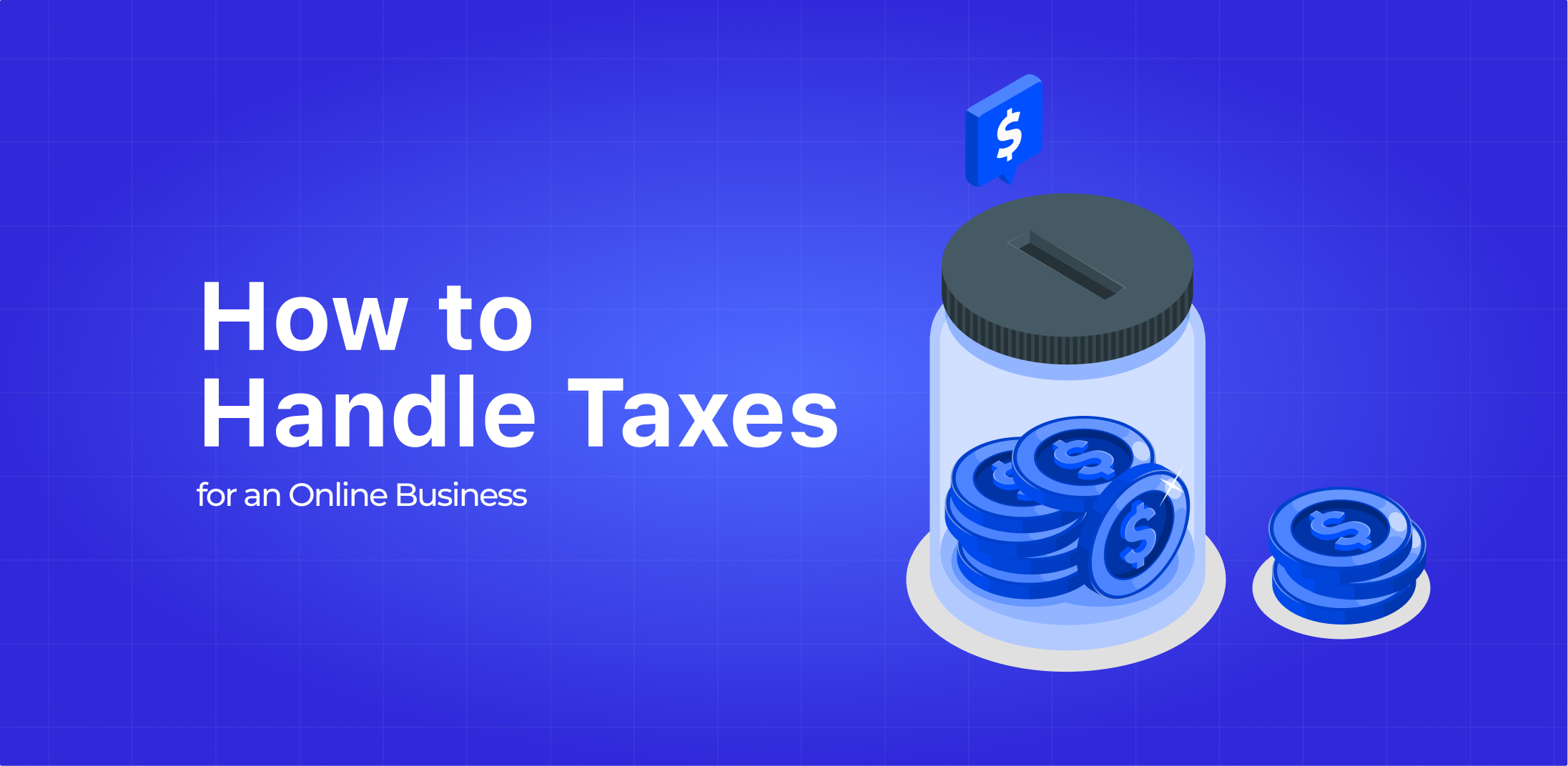Managing an online business offers numerous benefits, including flexibility, global market unlimited access, and reduced operational expenses. However, one crucial responsibility that digital entrepreneurs cannot overlook is taxation. Effective tax management is key to maintaining financial health, ensuring legal compliance, and securing long-term growth. A major hurdle for online owners is understanding and adhering to diverse tax regulations across different jurisdictions.
Sales tax, VAT compliance, and income tax requirements vary depending on customer locations, making tax management complex. Moreover, accurately tracking deductible costs—such as marketing expenses and software subscriptions—is essential for optimizing small business tax deductions and minimizing taxable income. Neglecting tax obligations can lead to serious consequences, including fines, audits, and legal complications. Late submissions, miscalculations, or failure to register for the appropriate sales tax can jeopardize a business’s financial stability.
To prevent these risks, entrepreneurs must stay informed, leverage tax software, or seek professional assistance. By proactively managing taxes and employing strategic financial planning, online businesses can remain compliant while maximizing efficiency.
Understanding Your Tax Obligations
Navigating tax obligations is a fundamental responsibility for online owners. It ensures legal compliance and prevents financial penalties. The complexity of taxation depends on factors such as business structure, location, and the nature of transactions. Staying updated on laws is essential to avoid unexpected liabilities.
Local, State, and International Taxes
Taxation occurs at different levels, each with its own regulations and requirements:
- Local taxes may include municipal fees, business licenses, or city-imposed levies. Some areas also apply additional local sales taxes.
- State taxes cover sales tax, income tax, and corporate tax for businesses operating within a particular state. Requirements vary widely depending on jurisdiction.
- International taxes affect businesses selling across borders. Companies must comply with VAT requirements, customs duties, and bilateral tax agreements that influence their tax responsibilities.
Failure to properly classify taxes at these levels can lead to underpayment, overpayment, or regulatory issues. To simplify management and minimize errors, using tax software for entrepreneurs can help automate calculations and streamline compliance.
Key Tax Categories for Online Businesses
Regardless of location, most online businesses need to manage several core tax types:
- Income Tax: Applied to business profits, income tax affects sole proprietors, LLCs, and corporations differently. Business owners typically need to file income tax reports annually or quarterly.
- VAT (Value-Added Tax): A consumption-based tax imposed at multiple stages of production and distribution, VAT compliance is essential for businesses selling digital products or services internationally.
- Sales Tax: Predominantly relevant in the U.S., it is charged at the point of sale and remitted to the appropriate state. Online retailers must determine if they have a “nexus” in a particular state, which affects their collection obligations.
- Corporate Tax: Companies registered as corporations must pay taxes on their net earnings. Tax rates vary by jurisdiction, and some governments offer incentives for reinvestment into the work growth.
Tax Obligations Based on Business Model
Different types of online businesses have distinct tax responsibilities:
- E-commerce businesses must manage VAT or sales tax based on customer location. International sellers must also navigate import duties and cross-border tax regulations.
- SaaS (Software-as-a-Service) providers often encounter digital taxation policies that vary by region. Some governments impose digital services taxes, making compliance more complex.
- Freelancers and independent contractors are responsible for managing their own income tax and setting aside funds for self-employment taxes. They can also benefit from deductions on expenses such as software, office space, and internet costs.
By understanding tax categories and regional regulations, online entrepreneurs can ensure compliance while optimizing financial efficiency. Leveraging tax software for entrepreneurs can help automate tax filings, track deductions, and prevent costly errors.
Registering Your Business for Tax Purposes

Registering your business for tax purposes is an essential step when starting an online work. By selecting the appropriate structure, acquiring the necessary tax IDs, and understanding how your business is classified for taxation, you can ensure compliance and optimize financial operations.
Choosing the Right Business Structure
The legal structure you choose for your business will impact its taxation, liability, and overall regulatory obligations. Common business structures include:
- Sole Proprietorship: This is the simplest and most common option for individual entrepreneurs. The income is reported on the business owner’s personal tax return. However, there is no legal separation between the business and the individual, which means personal assets are at risk if the business faces legal issues.
- Limited Liability Company (LLC): An LLC provides flexibility and protects the owner’s personal assets from business liabilities. It can be taxed as a disregarded entity (for a single-member LLC), a partnership (for a multi-member LLC), or an S-corporation, depending on how the LLC elects to be classified for tax purposes.
- Corporation (C-Corp or S-Corp): A corporation is treated as a separate legal entity and is taxed independently. C-Corps are subject to double taxation (taxed at the corporate level and again when profits are distributed to shareholders). In contrast, S-Corps pass income through to the shareholders’ personal returns, avoiding double taxation.
- Partnership: In a partnership, two or more individuals share ownership and profits. Partnerships file an informational tax return, but the income is passed through to the partners and taxed at their individual rates.
Choosing the right structure is crucial as it will directly influence the obligations. Seeking guidance from a tax advisor can help you select the most advantageous structure based on your business goals.
Steps to Obtain an EIN and Other Tax Identification Numbers
Once you’ve decided on your business structure, the next step is to obtain an Employer Identification Number (EIN) and any other tax IDs needed for compliance:
- Apply for an EIN: The EIN is a unique nine-digit number issued by the IRS. It is required for tax filings, hiring employees, and opening a business bank account. You can apply for an EIN online through the IRS website at no cost.
- Register for State Tax IDs: Depending on your business location, you may need to register for state-level tax IDs, which could be required for sales tax, payroll tax, or franchise tax purposes. E-commerce businesses selling across state lines should understand nexus laws to ensure proper sales tax collection.
- Obtain Local Licenses: In addition to federal and state tax IDs, some localities may require business licenses or permits. These are essential to comply with municipal regulations, even if you’re running a fully online business.
Ensuring you have the correct tax IDs in place will help avoid legal complications and allow your company to operate smoothly across different jurisdictions.
Understanding Your Business’s Tax Classification
Your business’s tax classification determines how it will be taxed and what returns it needs to file. The IRS classifies businesses based on their legal structure:
- Disregarded Entity: For single-member LLCs, income is taxed like a sole proprietorship, and it is reported on the owner’s personal tax return.
- Pass-Through Entity: Partnerships, multi-member LLCs, and S-corporations all pass income directly to their owners, who report it on their personal returns and avoid corporate taxes.
- Corporation: C-Corps pay taxes at the corporate level, separate from the shareholders, whereas S-Corps pass income to shareholders to be taxed on their personal returns.
Understanding how your business is classified ensures you meet your obligations and helps you plan for tax liabilities more effectively. By registering correctly and staying compliant, you can avoid issues and focus on growing your online business.
Sales Tax and VAT Compliance for Online Sales

Managing compliance with sales tax and VAT is a critical yet challenging part of running an online business. As tax regulations differ from one region to another, it’s important for businesses to understand where and how to collect sales tax and VAT to avoid penalties and ensure full compliance.
Determining Nexus and Where to Collect Sales Tax
Sales tax is typically imposed at the state or local level, and businesses are required to collect it in regions where they have a “nexus.” Nexus refers to a business’s connection to a particular state, city, or country that obligates the business to collect sales tax. In the U.S., nexus can be established in various ways:
- Physical Nexus: This occurs when a business has a tangible presence in a state, such as an office, warehouse, or employees working within that state.
- Economic Nexus: Many states have introduced economic nexus laws in response to the growth of e-commerce. These laws require businesses to collect sales tax based on the volume of sales or revenue generated within the state. For example, businesses may need to collect sales tax if they exceed a certain threshold, such as $100,000 in sales or 200 individual transactions, even if they don’t have a physical presence in the state.
- Marketplace Nexus: Selling through online marketplaces like Amazon, Etsy, or eBay may shift the responsibility of sales collection to the platform. In certain states, these platforms are required to collect and remit the tax for transactions made through their site. However, this doesn’t necessarily relieve businesses from their obligation to collect tax in states where they have nexus through other means.
To ensure accurate tax collection, it’s crucial for online businesses to closely monitor the nexus rules in each state. Nexus laws can differ greatly between jurisdictions, and they are subject to frequent updates, so staying informed about current regulations is essential for ongoing compliance.
VAT Compliance for International Sellers
For businesses engaged in international sales, complying with VAT (Value-Added Tax) regulations is a key component of managing cross-border transactions. VAT is a consumption tax applied to goods and services in many countries, particularly within the European Union, as well as other regions like Canada, Australia, and parts of Asia. Navigating VAT requirements is essential for businesses selling globally. Here are some critical factors to consider:
VAT Registration Requirements
If your business sells to customers in countries where VAT is applicable, you may be required to register for VAT in those jurisdictions, even if you don’t have a physical presence there. In some countries, VAT registration is mandated once a business exceeds a certain sales threshold, while others may require registration from the beginning, regardless of the sales volume.
Understanding VAT Rates
VAT rates vary significantly by country, and businesses must apply the correct rate based on the customer’s location. For instance, within the EU, each member state has its own standard VAT rate, such as 19% in Germany and 20% in France. Ensuring you apply the correct VAT rate is crucial for compliance and to avoid undercharging or overcharging your customers.
VAT for Digital Goods and Services
The rules surrounding VAT for digital products, such as software, online services, and downloadable goods, can be more intricate. In the EU, for example, VAT must be applied based on the customer’s location, not the seller’s. This means businesses must track where each customer resides to apply the appropriate VAT rate. This is particularly important for digital service providers who may sell to a diverse international audience.
Managing Deductions and Business Expenses
Managing deductions and business expenses effectively is crucial for online businesses seeking to reduce taxable income and boost profitability. By utilizing allowable deductions, business owners can reduce their tax burden and reinvest those savings into growing their business. Understanding which expenses are deductible and how to categorize them correctly is essential for maintaining tax compliance and ensuring smooth financial operations.
Common Deductible Expenses for Online Businesses
- Online businesses can take advantage of several deductible expenses that help reduce taxable income. Some of the most common include:
- Home Office Expenses: If you operate your online business from a home office, you may be able to deduct part of your housing costs, including rent or mortgage interest, utilities, and maintenance. To qualify for this deduction, the space must be used exclusively and regularly for business purposes.
- Software and Technology Tools: A necessary program and online tools for managing your business, such as accounting software, project management tools, email marketing platforms, and website hosting services, are deductible expenses.
- Marketing and Advertising Costs: Expenses related to marketing campaigns—such as Google Ads, Facebook Ads, influencer partnerships, and other promotional activities—are tax-deductible. These costs are considered crucial for business growth and acquiring new customers.
- Business Supplies and Equipment: Online businesses often need office supplies like computers, printers, and furniture, or specialized equipment for producing goods or services. These expenses can either be deducted in full or depreciated over time, depending on the asset’s expected lifespan.
- Shipping and Delivery Costs: E-commerce businesses can deduct expenses related to shipping and product delivery, including postage, packaging materials, and fees for transporting goods to customers.
- Employee Salaries and Benefits: Wages, salaries, bonuses, and benefits provided to employees, such as healthcare and retirement plans, can be deducted as business expenses.
How to Categorize Expenses Properly
Properly categorizing business expenses is essential for compliance and efficient financial management. Accurate categorization ensures that your deductions are legitimate and helps maintain organized financial records.
Here are some steps to categorize your expenses effectively:
- Create Expense Categories: Establish clear categories in your chart of accounts, such as office supplies, marketing, salaries, utilities, and rent. This structure simplifies bookkeeping and tax preparation.
Use Accounting Software: Accounting tools like QuickBooks, Xero, or FreshBooks automatically categorize expenses, making it easier to track and generate financial reports. - Separate Personal and Business Accounts: Ensure your business finances are separate from personal accounts by using a dedicated business bank account. This helps avoid mixing personal and business expenses.
- Maintain Detailed Records: Keep receipts, invoices, and bank statements for all business expenses. This documentation is essential for proper categorization and tax filing, and serves as proof in case of audits.
Importance of Keeping Accurate Financial Records
Accurate financial records are critical for both tax compliance and overall business success. Keeping track of your business expenses ensures you maximize deductions and avoid potential tax issues.
Here’s why accurate record-keeping matters:
- Maximize Deductions: Well-maintained records ensure that you don’t miss any deductible expenses, which can result in tax savings.
- Simplify Tax Filing: Organized financial records streamline the filing process, reducing errors and minimizing the risk of audits.
- Track Business Performance: Financial records offer valuable insights into your business’s financial health. Regularly reviewing your income and expenses helps in decision-making for growth and cost-cutting strategies.
- Prepare for Audits: Having accurate and complete records provides peace of mind in case of an audit. Tax authorities may require proof of deductions, and proper documentation helps avoid penalties.
Tax Filing and Reporting Forms

Tax filing and reporting forms are crucial for maintaining legal compliance and managing the financial health of your online business. Understanding when and how to pay taxes, staying on top of important deadlines, and deciding whether to hire an accountant or use the software are all key components of a successful tax strategy. Proper planning and adherence to tax laws can help avoid costly penalties and ensure smooth operations for your business.
Quarterly vs. Annual Tax Payments
One of the most important decisions for an online business owner is whether to make quarterly or annual tax payments. Both options carry distinct benefits and responsibilities.
- Quarterly Tax Payments: In the U.S., self-employed individuals, including many online business owners, are required to pay estimated taxes quarterly. These payments cover income tax, as well as self-employment tax, and they are typically due on April 15, June 15, September 15, and January 15 of the following year.
The IRS expects these quarterly payments to prevent underpayment at the end of the year, and failure to make these payments on time can result in penalties and interest charges. Quarterly payments help businesses stay current with their tax obligations and avoid a large tax bill at the end of the year. They are based on expected income for the year, so it’s essential to review business performance regularly and adjust payments if necessary.
- Annual Tax Payments: On the other hand, some businesses that are not required to make quarterly estimated tax payments can opt to pay taxes annually. This is typically applicable to businesses that expect low income or have irregular earnings, such as seasonale online businesses.
For most online businesses, paying taxes quarterly is the preferred method to avoid large tax bills and penalties at the end of the year. Business owners should carefully calculate their estimated taxes to ensure they meet these obligations.
Hiring an Accountant vs. Using a Small Business Tax Software
Online business owners face the decision of whether to hire a professional accountant or use a tax program to manage tax filing and reporting. Each option offers distinct benefits depending on the complexity of the business’s financial needs.
Hiring an Accountant
An accountant with expertise in business taxes can be a valuable asset, especially for companies with intricate financial structures, multiple revenue sources, or special tax deductions. Accountants stay up-to-date with constantly evolving tax laws and can ensure that your business takes full advantage of available deductions and credits. They are also capable of providing strategic tax planning, which can help minimize liabilities and optimize tax savings.
One of the key advantages of hiring an accountant is the peace of mind it offers. Knowing that an expert is handling your tax matters reduces the stress of compliance, and in case of an audit, they can represent your business to resolve any issues. Accountants are also ideal for businesses with complex needs, such as international sales, diverse product offerings, or complicated deductions.
However, this expertise comes with a higher cost compared to tax software. For small businesses or businesses with straightforward tax situations, the fees associated with hiring an accountant may not always be necessary.
Using Tax Software
Tax programs like TurboTax, QuickBooks, and H&R Block provide an affordable and user-friendly alternative for smaller businesses or business owners with less complicated profiles. These software platforms guide users through the tax filing process step by step, simplifying tasks such as entering financial information, calculating taxes owed, and ensuring that all required forms are filed.
For many online business owners, a tax program is sufficient, especially if their financial activities are relatively simple. The software typically includes features that help identify tax deductions and credits, ensuring that the business stays compliant with tax laws. Additionally, using the program allows entrepreneurs to manage their personal and business taxes in one place, streamlining the process.
However, tax software does have its limitations. While it can handle basic tax needs, users must ensure that the information they input is correct, as the software can’t offer the same level of tailored advice an accountant would provide. It’s also important to remember that tax laws can be complex, and the program may not always cover every scenario a business might encounter.
Handling Cross-Border Transactions and Currency Exchange Risks
Managing international transactions requires a solid understanding of the tax implications of cross-border payments. Businesses engaging in global trade often face tax obligations in different countries. Withholding taxes, which are taxes deducted at the point of payment, may apply to income paid to foreign contractors or employees.
However, these taxes can be reduced or eliminated through double taxation treaties, which ensure that the same income is not taxed in both countries. Beyond tax considerations, businesses must address the risks of foreign currency fluctuations. Currency exchange rate variations can affect the amount of money received or paid in international transactions, leading to financial gains or losses.
To manage these risks, businesses should incorporate currency risk management strategies, such as hedging, and choose appropriate currencies for their international dealings. This approach helps mitigate potential losses, ensuring financial stability while staying compliant with both domestic and international tax laws.
Simplifying Online Business Taxation with PaySaxas
PaySaxas provides streamlined payment solutions that simplify the intricate aspects of online business taxation. The platform is designed to facilitate seamless management of multi-currency transactions, enabling businesses to handle cross-border payments and comply with varying international regulations effortlessly.
PaySaxasplatform simplifies administrative tasks, enhances accuracy, and complies with international laws, making it an essential tool for navigating the complexities of online business taxation.
Conclusion on Business Taxes Matters
In conclusion, effective tax management for online businesses requires careful attention to various aspects, such as business structure, sales tax, VAT compliance, and international payment rules. By choosing the right business structure, staying updated on nexus regulations, and ensuring proper VAT adherence, business owners can maintain compliance and avoid penalties.
Key takeaways include the importance of maintaining accurate financial records, using business tax reporting tools, and understanding the correct tax classification. Deciding whether to hire an accountant or use tax program is crucial to streamline tax filing and ensure compliance. To reduce tax burdens, businesses should regularly evaluate their tax obligations, make use of available deductions, and plan ahead for international transactions and currency fluctuations.
By leveraging platforms like PaySaxas, online businesses can navigate the complexities of multi-currency transactions, ensuring compliance and operational efficiency. Ultimately, staying proactive, informed, and organized is vital to successfully managing online business taxes and ensuring growth while minimizing tax-related risks.
This article is provided for informational and educational purposes only and does not constitute legal, tax, or financial advice. It is not intended to be relied upon as tax advice or a substitute for consultation with a qualified tax professional. Readers are encouraged to seek independent tax advice from a licensed tax advisor or other qualified professional regarding their specific circumstances.








